Yellow Lab Mix With Husky With Blue Eyes
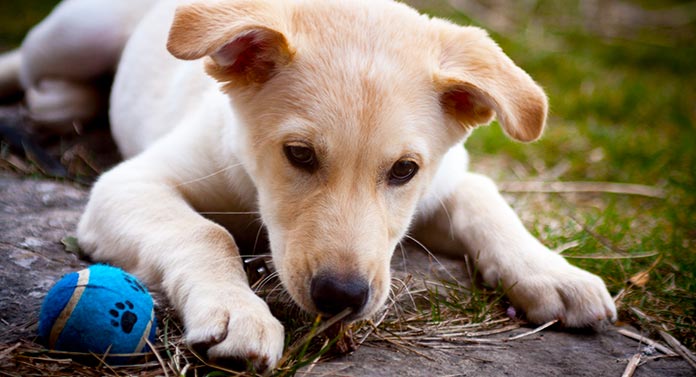
The Husky Lab mix can be a brilliant pet for the right home. We are going to take a look at whether your lifestyle is a good fit for this active, energetic mixed breed. Helping you to decide whether this puppy is the best choice for you, and giving you the information you need to raise them right.
People Often Ask…
- Are Husky Lab mixes protective?
- Are Lab Husky mixes good family dogs?
- What are good toys for a Lab Husky mix?
- Where can I find a Husky Lab mix?
What's In This Guide
- Husky Lab Mix At A Glance
- In-depth Breed Review
- Husky Lab Mix Training And Care
- Pros And Cons Of Getting A Husky Lab Mix
Lab Husky Mix : Breed At A Glance
- Popularity: Labs are first and Siberian Huskies are fifteen on the list of the most popular dog breeds!
- Purpose: Companion or service animal
- Weight: 40-60 pounds
- Temperament: Intelligent, active, friendly
Husky Lab Mix Breed Review: Contents
- History and original purpose of the Husky Lab mix
- Lab Husky mix appearance
- Lab and Husky mix temperament
- Training and exercising your Lab and Husky mix
- Husky Lab mix health and care
- Does the Husky Lab mix make a good family pet?
- Rescuing a Lab Husky mix
- Finding and raising a Husky Lab mix puppy
Origin Of The Husky Lab Mix
Mix-breed Labrador Husky puppies always have one parent who is a Labrador Retriever and one parent who is a Siberian Husky.
It doesn't really matter which parent is which.
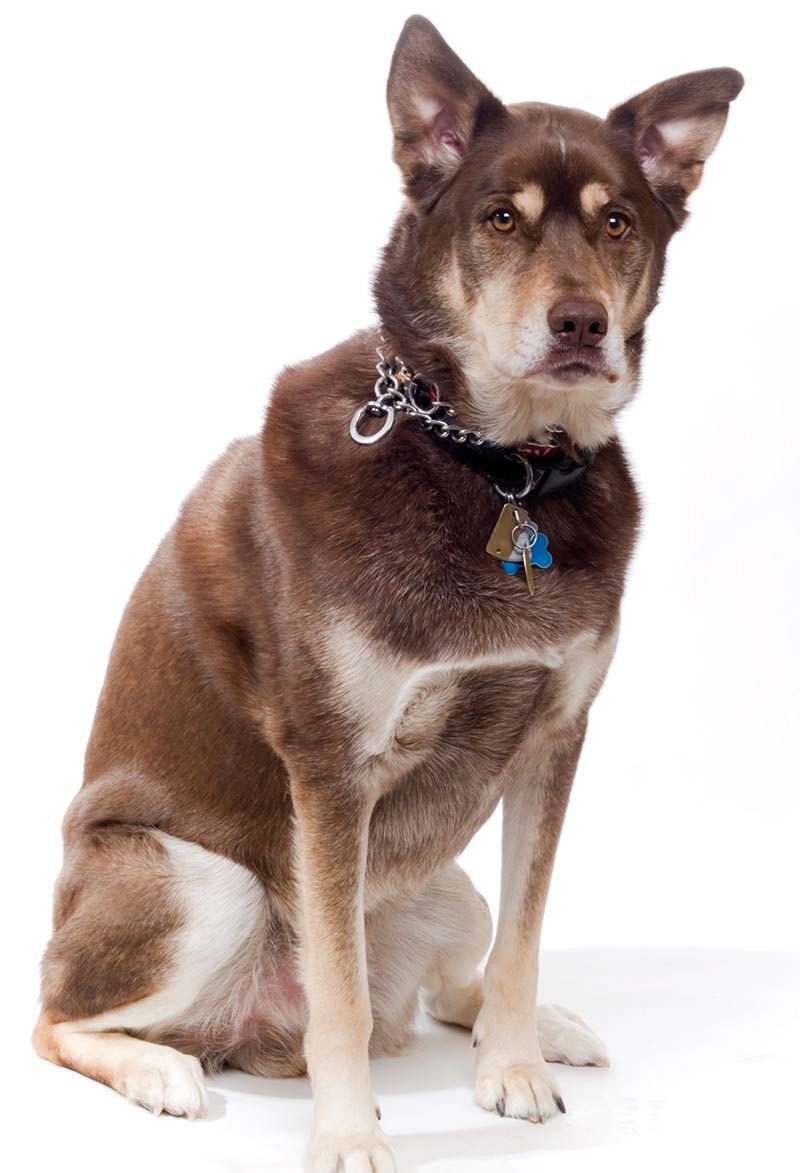
What is important here is that each parent is a purebred dog of one of those breeds.
To better understand the origins of Huskador or Siberian Retriever puppies, let's take a brief look at the history and characteristics of each parent breed.
Labrador Retrievers
The Labrador Retriever dog breed originates from Newfoundland, not nearby Labrador, as the dog's name might suggest.
Originally, Newfoundland was a British colony. This points to the Lab's English origins, even though today Newfoundland is a part of Canada.
Labs are working dogs, born with a job to do. As you might guess, that job typically involves the second word in their breed name – retrieving!
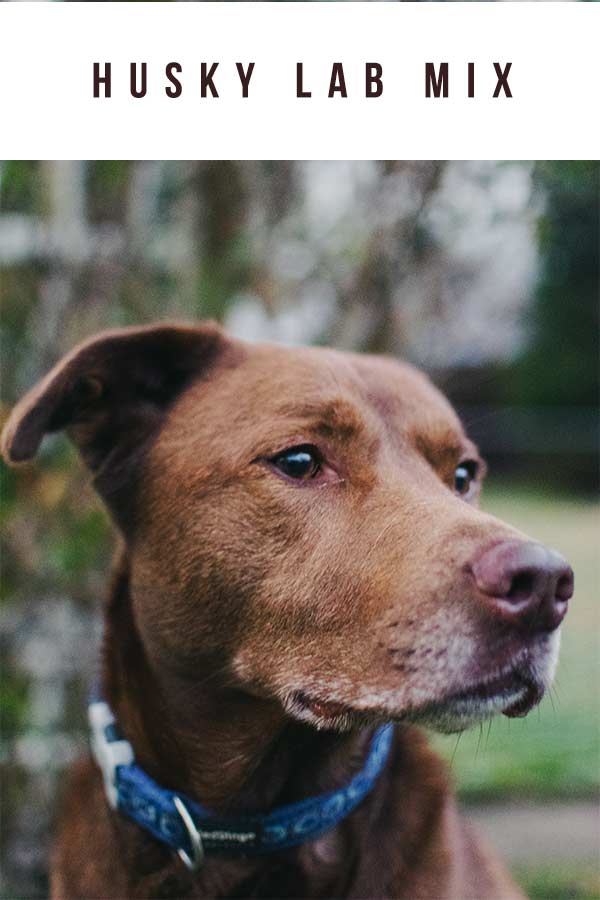
These dogs were bred to work closely with hunters to flush out and collect downed prey. Labs are loyal "people dogs." They make for fun-loving, affectionate, and playful pets.
They also tend to be very good with young children and families.
To learn more about the origins of this extremely popular dog breed, take a look at this article.
Siberian Huskies
It likely won't surprise you to learn that the breed known today as the Siberian Husky originated in Siberia, Russia.
Huskies are working dogs. Traditionally, a Husky's job has been to pull a sled for transportation. Historically, they helped out with hunting and gathering food, firewood, supplies, and other necessities.
These dogs were bred specifically to cohabitate and collaborate with people. They're typically great with children and adults alike. Overall, they make for wonderful, loyal pets and guard dogs.
To learn more about this ancient and respected dog breed, we invite you to review this informative post.
What To Expect From A Husky Lab Mix
In some ways, choosing a designer dog is always a bit of a gamble. You can never know for sure which parent traits from each breed a particular puppy may inherit.
Your dog may tend to take after the Husky breed, or the Labrador — or they could be a great balance of the two!
However, the parent breeds of a Huskador both share certain traits. So you can be reasonably certain that your Lab and Husky mix will be energetic, affable, and affectionate, as well as loyal and highly protective of their family.
They will also likely be hardworking, smart and eminently trainable.
And finally, you can likely expect your Siberian Retriever to be a great swimmer!
Lab Husky Mix Appearance
As a young puppy, your Labrador Retriever Husky mix may not appear too dissimilar from his litter mates. After all, what newborn puppy isn't all soft downy fur, pudgy baby fat, and adorable gangly legs?
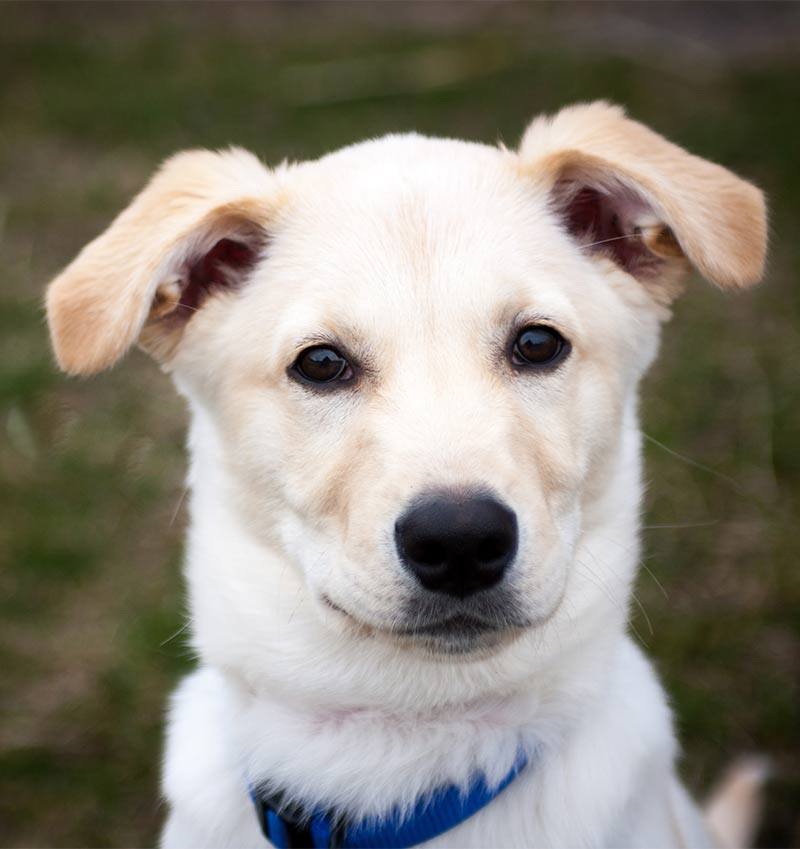
But as he grows up, each day will bring new surprises. Only time will tell which breed-specific traits he has inherited from his Labrador Retriever and Siberian Husky parents, respectively.
For example, your Husky Lab mix full grown may weigh anywhere from 40 to 60 pounds. He is likely to be athletic and powerful. Both parents grow up to about 24 inches in height, so you can expect a medium to large dog.
He may have facial and body features that lean more towards the Lab or the Husky. He could have brown eyes, blue eyes, or even one of each!
And, of course, those aren't the only physical features that are up for grabs. There's also the question of coat color.
Black Lab Husky Mix
Labs are well known for their different coats, and mixing a Lab of a certain color with a Husky could lead to a Huskador that has a dark coat.
Of course, there's an even chance that your black Lab Husky mix could take after his Husky parent in the fur department, too.
The one thing that's almost for certain is that your Huskador pup will have thick, medium length fur, as both parents have this trait.
Chocolate Lab Husky Mix
Chocolate Labs are some of the most popular pets around. It's difficult to dislike a dog that has "chocolate" right there in the name.
If you adopt a chocolate Labsky, you could very well end up with a Siberian Retriever puppy that has thick, warm, dark brown fur, just like the Lab parent.
Yellow Lab Husky Mix
Much like the other possible variants listed here, your yellow Lab Husky mix puppy could take after their Lab parent or their Husky parent.
But one thing is for certain — if you end up with a Huskador pup with a yellow Lab's pretty golden fur and a Husky's sharp, fox-like face, you'll have one gorgeous best friend.
Husky Lab Mix Temperament
Lab Husky mix temperament is where you will find the most uncertainty, since any puppy can tend more towards the temperament of one parent breed or the other.
That means that there is a range of potential Labrador and Husky mix temperaments that are possible in any Labsky puppy.
Your puppy may exhibit a calmer Labrador temperament or a more high-strung Husky temperament.
While they are likely to be smart, Husky Lab mix puppies could take after the Lab parent and be a quick, eager learner during training. Or they could be more stubborn and even inconsistent, like the Husky parent.
Husky Lab Mix Personality
A Huskador puppy could also have a more reserved personality, like a Husky. Alternatively, you could end up with a naturally exuberant Lab-leaning pup that reminds you of the canine star of Marley and Me.
Labs tend to bark only as needed. Huskies, on the other hand, tend to bark at anything and everything. Your pup could fall anywhere in between the two.
Digging is another issue, as Huskies are big on digging. Labs are known for chewing on anything they can find, which could also be an issue for your Siberian Retriever.
Overall, neither of the parent breeds are aggressive, so it's unlikely that your Labsky mix will be so. He will likely be very loyal and somewhat protective, however. Socialization is an important part of raising a well-behaved member of any breed or mix.
Lab Husky Mix Socialization
Speaking of socialization, it's important to fully socialize your puppy. From the day you bring him or her home, have plenty of visitors to the home.
Take your Huskador to a number of different locations to familiarize him with other environments.
Try to get your pup to meet as many different people, vehicles and animals as possible.
Socialization is important to the well-being and good behavior of every breed, even ultra-friendly Labs. Huskies, as mentioned, tend to be a bit more reserved, so socialization is vital for this mix.
Training And Exercising Your Lab Husky Mix
For decades, dog training was all about establishing the "alpha" pack leader. Leading trainers taught that there were only two choices: either your dog was the alpha, or you were the alpha.
However, we know differently now.
For a dog, there is no such thing as alpha, or dominance, or pack leader, or even anything similar to any of these concepts. As long as you provide your dog with his daily required resources, your interspecies family life is likely to go quite smoothly overall.
Now, this is not to say that some dogs don't inherently possess a stubborn, aggressive, fearful, or combative nature.
Husky Lab Mix Behavior
In fact, the purebred Siberian Husky breed is known to exhibit some of these traits far more frequently than purebred Labrador Retrievers. This can make training more challenging and time-consuming if your Labsky puppy tends more towards the Husky side of his parentage.
But whether such behavioral traits show up in your puppy or not, these behaviors are never about winning dominance over you or becoming the pack leader.
These traits are either inbuilt breed-specific characteristics, or fear-based responses to perceived scarcity of needed resources.
Ultimately, your puppy is dependent on you for every need that he has. Understanding this can eliminate your concern over alpha-type struggles.
To learn more about how dominance theory in dog training was debunked and replaced with positive and affirming dog training methods that really do work, we invite you to review this informative post.
Huskador Puppy Training
All pups need consistent training in order to become well-behaved adults. This is true regardless of the breed or mix!
Some important training goals include potty training and crate training.
Huskador Exercise
The Husky Lab mix comes from two active, energetic, "working dog" breed parents. Boredom can be a real problem for these dogs, as they are literally bred to stay active all day, every day. Often, they perform very physically demanding jobs!
So you can pretty much count on the need to keep your Siberian Husky Lab mix dog active and busy. Otherwise, she may develop her own itinerary of fun activities to pursue.
Lab Husky mix dogs also have webbed paws and a natural love of water. Swimming is a great activity for them. So is any game of fetch that involves retrieving a bobbing toy from the water.
They also love to run and will eagerly enjoy long runs off-leash if your situation permits.
Lab mixes are at risk of hip dysplasia, so be careful with younger dogs and keep their exercise at appropriate levels.
Lab Husky Mix Health And Care
A Lab and Husky mix puppy may inherit known health issues from either the Labrador or the Husky gene pool. Therefore, it is critical to conduct health testing when selecting a designer dog puppy.
This is the only way to know if breed-specific congenital health issues may be present.
Each breed may have health issues that are inherited or acquired along the way. It's important to know the risks involved in any particular dog breed or mix.
Labrador Health
Labrador Retrievers are known to be prone to the following health conditions:
- Exercise-induced collapse
- Food allergies and/or seasonal pollen allergies
- Hemophilia
- Hip/elbow dysplasia
- Arthritis
- Obesity
- Dental issues
- Thyroid imbalance
- Myopathy
- Glaucoma
- Cancer
- PRA
- Ear problems
- Skin allergies
Siberian Husky Health
Siberian Husky dogs are known to be prone to the following health conditions:
- Arthritis, a common issue for older dogs that overweight Huskies are particularly prone to develop
- Acute caudal myopathy
- Kerato-conjunctivitis sicca
- Degenerative Myelopathy
- Cataracts
- Epilepsy
- Glaucoma
- Laryngeal paralysis
- High blood pressure
- Obesity
- Cancer
- Dental issues
Lab Husky Mix Health
From these lists, you can get a good sense of the potential genetic issues any Lab Husky mix puppy may inherit, as well as other health issues, such as a natural love of food that can easily lead to obesity.
Make sure that as a minimum the Lab parent has good hip and elbow scores, a clear eye test, and is clear for PRA.
As a minimum the Husky parent should have a clear eye test.
Lab Husky Mix Life Expectancy
Generally speaking, the Labrador Retriever has a life expectancy of 10 to 12 years.
The Siberian Husky, in turn, has an average lifespan of 11 to 13 years.
These statistics would indicate a Lab and Husky mix might live anywhere from 10 to 13 years, which is generally considered an accurate lifespan range for these designer dogs.
Half Husky Half Lab Shedding
If there is one fact nearly all Lab Husky mix dog owners agree on, it is this: the Labsky dog tends to shed. A lot.
The reason for this is simple: the Siberian Husky grows a double-thick coat as protection against the freezing Siberian climate.
This means that even a Lab Husky mix who inherits more Lab traits will still shed more than your average Labrador, although likely less than your average Husky.
Now, if your dog inherits more Husky traits, you can look forward to a jaw-dropping level of shedding at least twice a year as your pup sheds his thick undercoat and prepares to regrow it.
Husky Lab Mix Grooming
Regardless of which end of the spectrum your pooch tends towards, the best way to control Lab Husky mix shedding is to brush your dog regularly.
You can use a tool called an undercoat rake to make the shedding process much more comfortable for your dog and more manageable for you.
Take time once or twice per week to groom your dog. This will give you some control over when and where the hairs fall out. Also, it gives you some regular enjoyable bonding time with your pup.
Do Lab Husky Mixes Make Good Family Pets?
Both Labradors and Huskies make excellent, loyal, affectionate pets for a family home. However, consideration should be given to whether or not you have the time and ability to ensure your dog gets enough exercise. Environment, additionally, plays a part.
If you live in a more tropical climate that stays warm to hot year-round, a shorter haired pup can be a more compassionate choice.
And as you can see, this simply isn't a suitable pet dog choice for a sedentary owner.
Huskadors don't just love to exercise – they need daily vigorous activity to stay healthy in body and mind as well as to stay out of trouble.
But if your family can dedicate enough time each day to play with and exercise your Huskador, this mix could be a great choice for you.
Similar Breeds
A Huskador is definitely a unique mix! By this point, you're probably convinced of that.
However, if you have decided that a this mix isn't quite right for you, or if you're having trouble finding one, here are some other possible mixes that you might be interested in.
- Labernard
- Black Lab Pitbull Mix
- Springador
- Goldendoodle
Rescuing A Lab Husky Mix
Rescuing a dog of any breed is always encouraged, if you have the circumstances. Rescue dogs are in need of a second chance. When a family reaches out to adopt a dog in need, they provide a loving home to an animal that may not otherwise find one.
In return, your new friend will reward you with loyalty and affection!
Husky Lab Mix Breed Rescues
Currently, there aren't any rescue organizations dedicated to Husky Lab mixes. However, there are plenty for both Huskies and Labrador Retrievers, in the USA, UK, Australia, and Canada.
We recommend reaching out to these rescue societies to ask about any Huskador dogs in need of adopting.
Here are a few to get you started.
- Californian Siberian Husky Rescue
- Happy Tails Arctic Rescue
- Labrador Retriever Rescue of Southern England
If you have found any rescues that work with this mix, or if you know of any Lab or Husky rescues that might have good leads on a Huskador, please let us know in the comments!
Finding A Husky Lab Mix Puppy
As with any dog, designer, purebred or mutt, there are two main ways to choose your canine sidekick. You can purchase a pup from a breeder or you can adopt a pup from a rescue organization or animal shelter. Each has its own pros and cons.
In the case of a Husky Lab mix puppy, whether or not you consider adoption may depend on how determined you are to get an authentic Husky Lab mix.
As the appearance of this mix can vary greatly, the only way to determine true breed lineage, much of the time, is to pay for genetic testing.
Of course, this is often an option with rescue operations today. Some organizations will even volunteer to pay for this testing if it supports placing a puppy or adult dog with a loving new "forever home" and family.
When you purchase your puppy from a breeder, that breeder should be able to provide you with registration papers verifying the purebred parentage of your puppy. If these papers are not available, the only way to know if your puppy is truly a Husky Lab mix is to do genetic testing.
Husky Lab Mix Popularity
Overall, mixes (or "designer dogs") are steadily growing in popularity. And with two popular parents, there's a good chance that you might find a Huskador puppy in your area.
There is so much to consider when choosing "your" puppy from out of a whole litter of Husky Lab mix puppies!
From genetic health testing, to temperament assessment, to gender and appearance — your personal list of the most important criteria will be unique to your family, your lifestyle and your preferences.
Of foremost importance, however, is to ensure that you do not adopt from a puppy mill or pet store. These are unscrupulous businesses that don't have the health and happiness of their animals at heart.
For a thorough guide to finding a puppy, take a look at our step by step article.
Husky Lab Mix Breeders
Litters bred by show breeders may knowingly or unknowingly select for appearance characteristics over good health, strength and/or temperament, so use caution.
Wherever possible, seek out a breeder that breeds for working dog traits, as this focus has the potential to produce the healthiest pups overall.
Observe and, if possible, interact at length with both parent dogs to experience their personality and temperament – avoid any breeder that will not permit you to meet the parents of the litter you are considering.
Place priority on outgoing, curious and friendly pups that approach you of their own accord and show no fear.
Examine the puppy's eyes, ears, mouth, tongue, paws, skin, tail and underside to make sure all areas look clean and healthy.
What To Ask For
Ask for the name of the breeder's veterinarian and for referrals to past happy customers. Give them each a call to inquire about the operation.
Ask for a health history of the parents and past litters as well as any information about genetic testing for congenital health issues. Verify that the puppies have received all recommended vaccinations for their age and breed and that they are certified as free from parasites like tapeworms and roundworms.
Take a tour of the breeder's premises to ensure it is clean, secure and professional in every way. Do research on the internet about their reputation.
Ask about the food the parents and puppies have been fed and why that food was chosen (food quality can greatly influence the health of a litter of puppies).
Go with your gut instinct: if you have any doubts, walk away and seek a Lab Husky mix puppy elsewhere.

Husky Lab Mix Puppy Price
Be aware of the market rate price for Lab Husky mix puppies in your area. Steer clear of "bargain" pups or too-high priced litters.
The price range for a Husky Lab mix puppy can span anywhere from $300 to $800. It depends on availability, the breeder, parental lineage, gender, birth order, coat and eye coloration, overall appearance, and other prized characteristics.
Be sure to find out what the total price includes, such as papers, proof of vaccinations, and good health guarantee for at least 6 to 12 months.
If any of these are not provided along with the price, it is usually best to walk away and look for a puppy elsewhere.
Husky Lab Mix Products And Accessories
- The best dog food for Labs
- Husky grooming supplies
- Best puppy toys
Is A Lab Husky Mix Right For Me?
This is a great question – and it is also one that only you can answer!
To summarize, let's take a look at the Pros and Cons of getting a Husky Lab mix.
Cons:
- Needs lots of exercise
- Will probably shed a lot
- May be more aloof if it takes after the Husky parent
- May like to dig and chew
Pros:
- Likely to be very intelligent
- A great companion or service animal
- Extremely loyal
- A good family dog
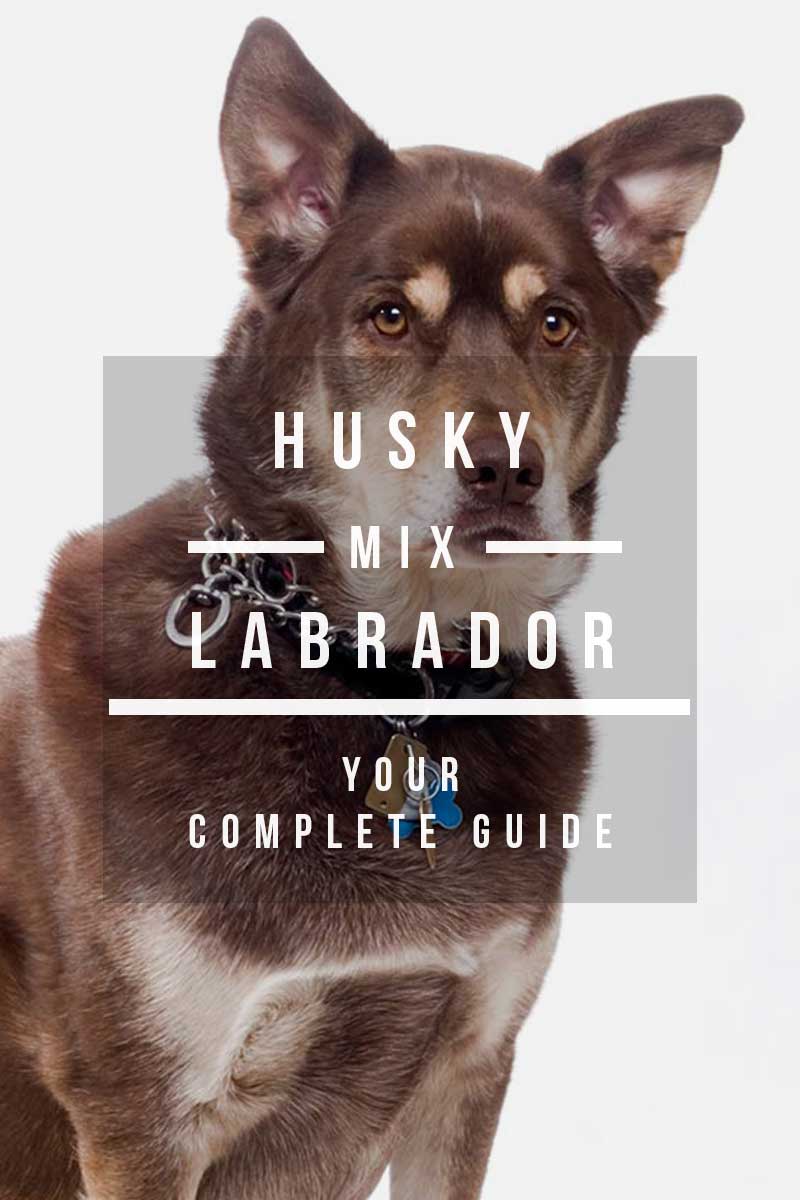
Your Husky Lab Mix
You will need to have lots of time to dedicate to training and exercising your dog. If you are constantly away from home, this may not be the ideal mix for you.
However, do you have the time, interest, energy, budget and lifestyle to provide one of these unique dogs with the care they require to thrive?
Then what are you waiting for? Best of luck finding your new Huskador friend!
Do you have a Lab Husky mix? We'd love to hear all about them in the comments below.
Related Articles
- Lab Mix: A Guide To Labrador Cross Breeds
References And Resources
- Gough A, Thomas A, O'Neill D. 2018 Breed Predispositions to Disease In Dogs and Cats. Wiley Blackwell
- O'Neill et al. 2013. Longevity and Mortality of Owned Dogs In England. The Veterinary Journal
- Adams VJ, et al. 2010. Results of a Survey of UK Purebred Dogs. Journal of Small Animal Practice.
- Schalamon et al. 2006. Analysis of Dog Bites In Children Who Are Younger Than 17 Years. Pediatrics
- Duffy D et al. Breed differences in canine aggression. Applied Animal Behavior Science 2008
- Strain G. Deafness prevalence and pigmentation and gender associations in dog breeds at risk. The Veterinary Journal 2004
- Packer et al. 2015. Impact of Facial Conformation On Canine Health. PlosOne
- Den Herder, J.S., DVM, et al, "Your Labrador Retriever," Den Herder Veterinary Hospital, 2010.
- Den Herder, J.S., DVM, et al, "Your Siberian Husky," Den Herder Veterinary Hospital, 2010.
- Hines, R., DVM, "Choosing the Right Dog for You and Your Family – A Veterinarian's Perspective," 2nd Chance, 2017.
- Farrell, L.L., et al, "The challenges of pedigree dog health: approaches to combating inherited disease," Canine Genetics and Epidemiology, 2015.
This article has been extensively updated.

The Labrador Site Founder

Pippa Mattinson is the best selling author of The Happy Puppy Handbook, the Labrador Handbook, Choosing The Perfect Puppy, and Total Recall.
She is also the founder of the Gundog Trust and the Dogsnet Online Training Program
Pippa's online training courses were launched in 2019 and you can find the latest course dates on the Dogsnet website
Source: https://www.thelabradorsite.com/husky-lab-mix/
0 Response to "Yellow Lab Mix With Husky With Blue Eyes"
Post a Comment